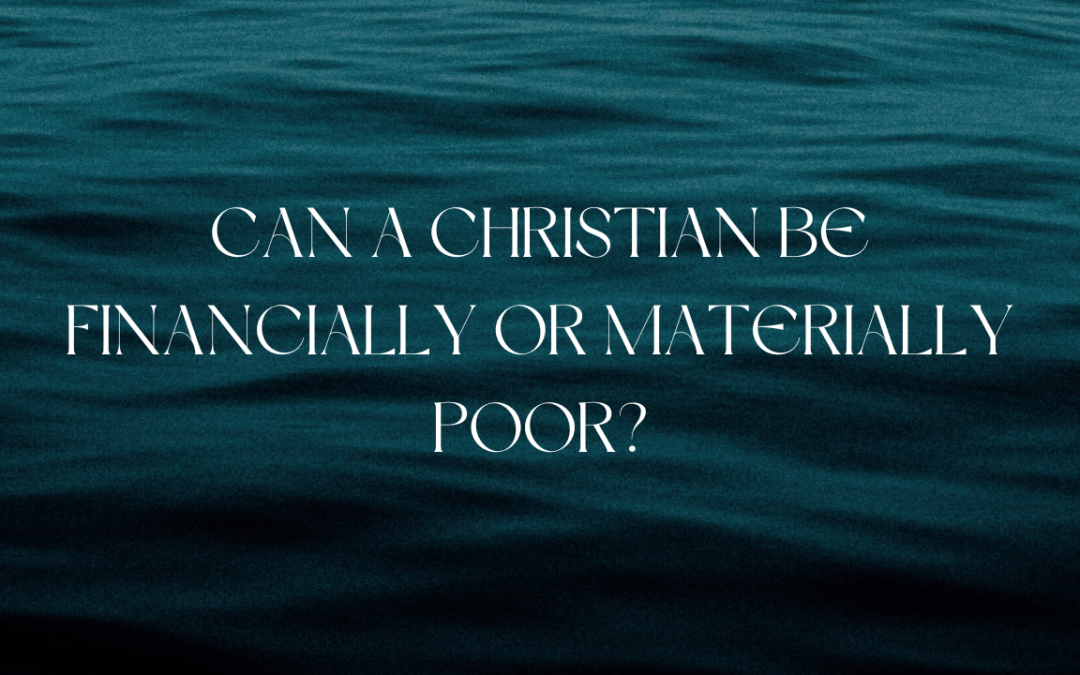This seems to be one of the most common misconceptions about Christianity. People presume that Christians are supposed to live in poverty or material lack. Some people even argue that wealth and material possessions are sinful and that Christians are meant to give them up entirely. But, is this what the Bible teaches us? In answering this week’s question, we will be exploring scriptures to better understand the principles of the Christian faith and establish whether Christians are supposed to be financially or materially poor.
The best way to begin is to acknowledge that as a Christian, you should know that the Bible does not condemn you from having wealth or possessions. In fact, we see several stories of God’s people in the bible being blessed with abundant wealth and material possessions, such as Abraham, Job, Solomon, and Joseph of Arimathea. Deuteronomy 8:18 tells us that it is God who gives us the power to create wealth. It is clear, then, that wealth and material possessions are not inherently evil.
The state of poverty, however, can sometimes be a result of our poor financial decisions. There are also people that are lazy or simply refuse to work. Proverbs 10:4 tells us that ‘anyone who has a slack hand remains poor’. Apostle Paul in 1 Thessalonians 4:10-12 says ‘We urge you, brethren, that you work with your own hands so that you may walk properly toward those who are outside and that you may lack nothing’. This goes to show that despite the fact that we are blessed with spiritual riches as Christians, we still have a part to play in making an earning here on earth. Oftentimes, this might involve making use of your God-given talents and gifts. Other times, this will require you to be wise and seek wisdom in the knowledge that is available in this world by upskilling, reading, researching and networking in the field or career path you find yourself in.
However, the Bible does warn us about the dangers of the love of money and the pursuit of wealth at the expense of our relationship with God. Jesus himself cautions us against the allure of wealth in Matthew 6:24, stating that we cannot serve both God and money. Similarly. 1 Timothy 6.9-10 warns us that the love of money can lead to all kinds of evil. In Matthew 19:21, a rich man in the Bible came to Jesus and asked what he needed to do to inherit eternal life. Jesus answered him and said to sell what he had to the poor and He will find treasure in Heaven if he followed Jesus’. In his refusal to do this, Jesus said to his disciples that ‘it is hard for a rich man to enter into the kingdom of heaven’. This is not because he was rich but because he exalted his riches over the glory of God. This is why Jesus warned us about the snare of riches.
So, what does this mean for Christians? It means that we should not idolize wealth or possessions but should instead seek to use them for God’s glory and to help others. In other words, our focus should be on the proper stewardship of the resources that God has given us, whether great or small. We are called to care for the poor and the needy, which is a clear indication that Christians are not meant to live in poverty or material lack. Proverbs 14:31 tells us that whoever oppresses the poor shows contempt for their Maker, but whoever is kind to the needy honours God. In Matthew 25.34-40, Jesus commends those who fed the hungry, gave drink to the thirsty, clothed the naked and visited the sick and imprisoned. James 2:15-17 warns us that if we see a brother or sister in need but have no compassion on them, our faith is dead.
Therefore, while Christians should not seek wealth and possessions for their own sake, we are not called to live in poverty or material lack. Instead, we are called to use our resources to honour God, care for others, and advance His kingdom. Above all, we are reminded by Paul in Philippians to learn how to be content. Paul’s writing in Philippians 4:11-13 speaks about this need for a balance in being able to Glorify God through any season. ‘I have learned in whatever situation I am to be content. I know how to be brought low, and I know how to abound. In any and every circumstance, I have learned the secret of facing plenty and hunger, abundance and need. I can do all things through him who strengthens me’. Paul exemplifies a form of balance in this scripture that shows us that although we are not called to be poor if we find ourselves in a season of lack, we know to be content and are strengthened by the spirit of God.
This is really important as we know the bitterness, desperation and greed that can be borne out of the mind of a poor man. In Proverbs 30:8-9, Agur the son of Jakeh says “Keep deception and lies far from me; Give me neither poverty nor riches; Feed me with the food that is my portion, So that I will not be full and deny You and say, “Who is the Lord?” Or that I will not be poor and steal, And so profane the name of my God’. In this scripture, Agur describes how being rich could make him lose sight of God and how being poor could make him disrespect God and also fall into the act of stealing. This is where Paul’s writing comes to life, that we know who we are, who we belong to and what we are called to do. So that regardless of where we find ourselves, whether surrounded by an abundance of riches or a season of lack, our sight of God is not moved because we know to be content in Him.
In conclusion, Christians are not supposed to be financially or materially poor, but neither are we to pursue wealth and possessions at the expense of our relationship with God and others. Instead, we should seek to be content and be good stewards of the resources that God has given us, using them to honour Him and care for others. As the Apostle Paul says in 1 Corinthians 10:31, ‘So whether you eat or drink or whatever you do, do it all for the glory of God’.
Till next time,
Remember to be proactive & content


